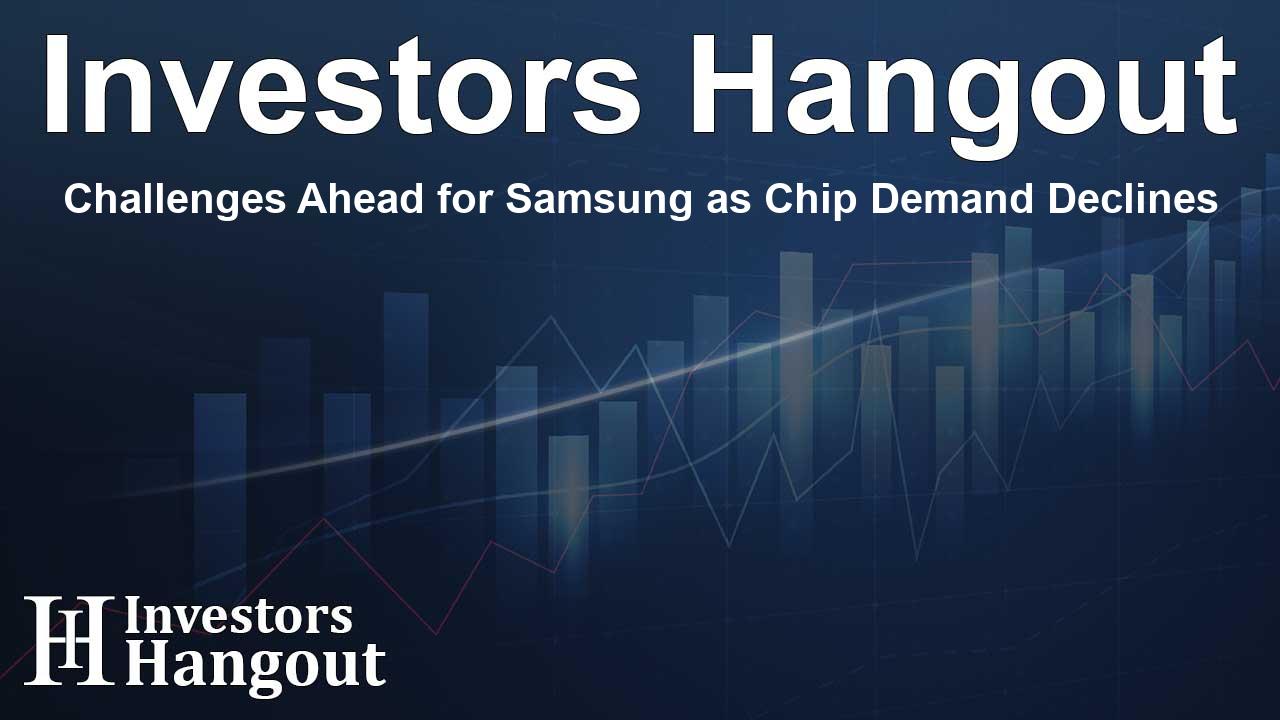Challenges Ahead for Samsung as Chip Demand Declines

Samsung Electronics Faces Tough Challenges in Chip Market
Samsung Electronics has recently revealed its earnings guidance, highlighting a keen awareness of the challenges facing the semiconductor industry. The competitive landscape and shifting consumer demands have influenced expectations. The company's anticipated quarterly sales stand at approximately $51.38 billion, marking a notable increase from previous figures.
Sales and Profit Outlook
The guidance outlines a projected operating profit of 6.5 trillion Korean won, significantly higher than last year’s 2.82 trillion won. This forecast follows an impressive earnings report for the third quarter, where Samsung reported sales of 79.1 trillion Korean won and an operating profit of 9.18 trillion Korean won. These figures illustrate the ongoing volatility in the semiconductor sector affected by numerous market forces.
Competitive Pressures in the Semiconductor Sector
This cautious profit guidance arises from various factors, notably research and development costs, and the challenging task of ramping up manufacturing capabilities to meet the demands of major clients like Nvidia Corp (NASDAQ: NVDA). The competition for high-bandwidth memory (HBM) chips is intense, with other companies swiftly gaining market share.
Nvidia's Influence on Samsung's Production
To further illustrate this point, Nvidia has opted to partner with SK Hynix as their primary supplier of HBM chips for artificial intelligence graphics processing units, placing additional pressure on Samsung. While Samsung has received approval for its fifth-generation HBM3E chips, it is still awaiting the green light for its advanced 12-layer HBM3E chips, which Samsung anticipates will account for a significant portion of its HBM sales.
Market Dynamics and Future Growth
The overall HBM market presents a fascinating prospect for growth. Morgan Stanley has estimated that the HBM sector could escalate from a valuation of $4 billion in 2023 to an astonishing $71 billion by 2027. This growth reflects rising demands in sectors such as artificial intelligence and advanced computing.
Micron's Position and Market Opportunities
While Micron Technology, Inc. (NASDAQ: MU) has recently emerged as one of the key players in the sector, the company faces challenges in the Chinese market due to geopolitical tensions. However, this situation can be advantageous for Samsung, evidenced by reports that companies like Huawei and Baidu Inc (NASDAQ: BIDU) are increasing their purchases of Samsung HBM chips amid the restrictions impacting their own suppliers.
Conclusion: Navigating Uncertain Markets
As Samsung continues to navigate the complexities of its industry, the importance of adaptability and innovation remains paramount. With changing consumer preferences and fierce competition, Samsung's strategies will play a critical role in securing its position as a leader in the semiconductor market. The company will need to capitalize on emerging trends and technologies while addressing the immediate challenges it faces.
Frequently Asked Questions
What is Samsung Electronics’ current sales guidance?
Samsung Electronics is anticipating quarterly sales of approximately $51.38 billion for the upcoming quarter.
How is competition affecting Samsung's profit forecasts?
The increase in competition, especially from firms like SK Hynix, is significantly impacting Samsung’s profit outlook due to pricing pressures and market share loss.
What impact does Nvidia have on Samsung's chip production?
Nvidia's choice to prioritize suppliers like SK Hynix for HBM chips poses a challenge for Samsung, influencing its production strategies and market approaches.
What is the projected growth of the HBM market?
According to estimates, the HBM market is projected to grow from $4 billion in 2023 to an impressive $71 billion by 2027.
How do geopolitical factors affect Micron and Samsung?
Geopolitical tensions, particularly around the Chinese market, are providing opportunities for Samsung as Micron faces significant challenges due to restrictions, leading to increased purchases from Huawei and Baidu.
About Investors Hangout
Investors Hangout is a leading online stock forum for financial discussion and learning, offering a wide range of free tools and resources. It draws in traders of all levels, who exchange market knowledge, investigate trading tactics, and keep an eye on industry developments in real time. Featuring financial articles, stock message boards, quotes, charts, company profiles, and live news updates. Through cooperative learning and a wealth of informational resources, it helps users from novices creating their first portfolios to experts honing their techniques. Join Investors Hangout today: https://investorshangout.com/
Disclaimer: The content of this article is solely for general informational purposes only; it does not represent legal, financial, or investment advice. Investors Hangout does not offer financial advice; the author is not a licensed financial advisor. Consult a qualified advisor before making any financial or investment decisions based on this article. The author's interpretation of publicly available data shapes the opinions presented here; as a result, they should not be taken as advice to purchase, sell, or hold any securities mentioned or any other investments. The author does not guarantee the accuracy, completeness, or timeliness of any material, providing it "as is." Information and market conditions may change; past performance is not indicative of future outcomes. If any of the material offered here is inaccurate, please contact us for corrections.